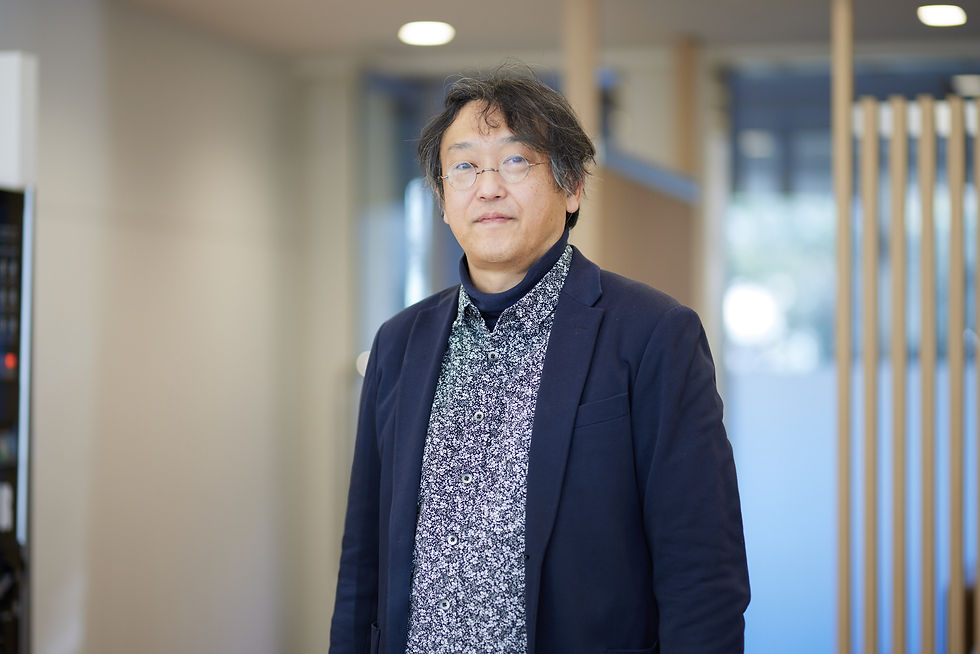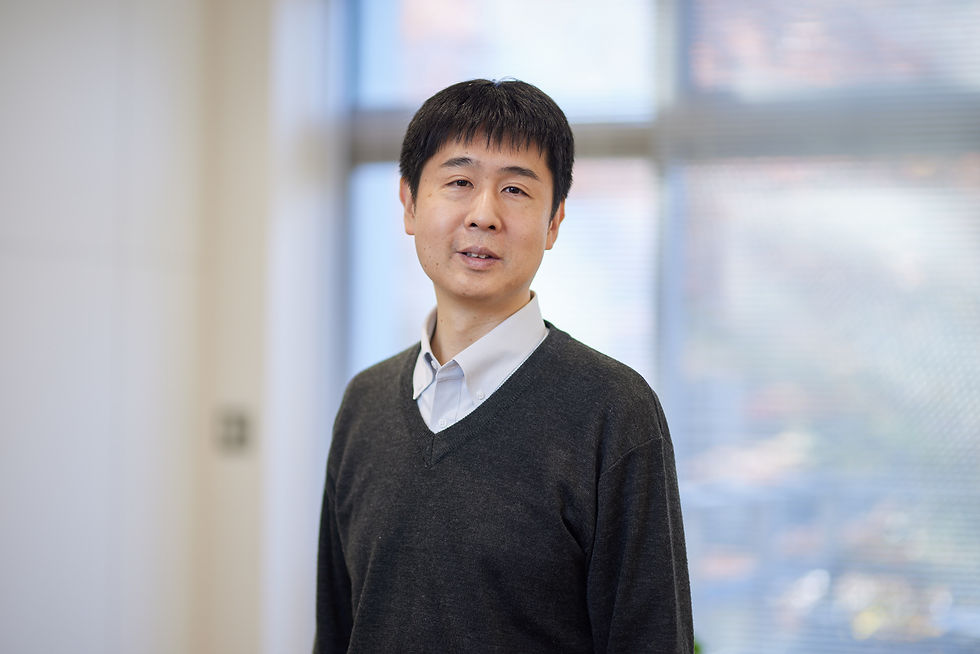Department Of Mechanical
Engineering
Mastering "Long-established" and "Forefront" Mechanical Technology as the Fundamentals of Engineering Disciplines
Design, energy control, and production technology. These are the three fundamental areas of mechanical engineering into which the long-established manufacturing technology and knowledge are instilled. In the Faculty of Mechanical Engineering, we value the knowledge and technical skills, as we acquire cutting-edge knowledge, skills and techniques, and foster engineers who have mastered their skills and flexibility to support the hardware side of engineering.

Design
Students acquire knowledge of industrial design to create products, learn about making business proposals, and master techniques such as mechanism development, structural analysis and design methods using CAD/CAM/CAE. We foster engineers with practical skills that are required in the field of production.

Design
Students acquire knowledge of industrial design to create products, learn about making business proposals, and master techniques such as mechanism development, structural analysis and design methods using CAD/CAM/CAE. We foster engineers with practical skills that are required in the field of production.

Energy Control
Students master applied technology about fluid and heat in order to acquire the techniques that contribute to high efficiency of power related equipment such as engines and also the effective use of renewable energy such as wind power generation. They also master knowledge on mechanism, mechanical control and measurement in order to become engineers who contribute to high functionality of robots and processing equipment.

Production Technology
Students master practical knowledge and skills of production technology by learning materials and processing methods. Furthermore, they nurture abilities to develop new materials and discover new processing methods. We foster engineers who contribute to better precision, high quality and low-cost production.

Faculty
Faculty
Energy Control
Students master applied technology about fluid and heat in order to acquire the techniques that contribute to high efficiency of power related equipment such as engines and also the effective use of renewable energy such as wind power generation. They also master knowledge on mechanism, mechanical control and measurement in order to become engineers who contribute to high functionality of robots and processing equipment.


Michio Nakano
Dr. ( Eng.) Hokkaido University Internal Combustion Engine, Combustion Engineering Anti-Knock Combustion, HCCI (Homogeneous Charge Compression Ignition) Combustion, Chemical Kinetic Simulation Oral Presentation Award 2003, Society of Automotive Engineers of Japan Outstanding Technical Paper Award (57th), Society of Automotive Engineers of Japan Professional Engineer, Society of Automotive Engineers of Japan
Professor

Shinichi Ninomiya
Dr. (Eng.) Toyama Prefectural University, Precision machining, Production engineering, Quality engineering Development of new processing method in precision machining or environmental technology, Electrical Machining Symposium '07, An award for the best paper, Musashi institute of technology (2009.3)
Professor

Yasuhiko Murata
Dr. (Eng.) The University of Tokyo, Polymer Processing Injection Molding, Micro Molding, Die; Best Paper Award, Society of Plastic Engineer, Best Paper Award, Japan Society of Plastic Processing; Lecturer, The University of Tokyo
Professor

Masahiko Jin
Dr. (Eng.) Utsunomiya University, Advanced Machine Tools Metal cutting, Precision machining, Production engineering, Machine tool;
Professor

Yoshiaki Tanzawa
Dr. (Eng.) Waseda University, Energy Engineering Wind turbine, Wind-power generation, Power and energy system; The Best Paper Award in Wind Energy at WREC 2002, The Best Poster in World Energy Generation at WREC2000,The Best Presentation Award (Power and System Division of Japan Society of Mechanical Engineers); JSPS Research Fellow, Assistant at Advanced Research Institute for Science and Engineering Waseda University
Professor

Xiaoyou Zhang
Dr. (Eng.) Tokyo Institute of Technology, Advanced Mechanical Systems Maglev actuator and its application E-mail: zhang@nit.ac.jp
Professor

Shouichi Hosoda
Master (Eng.) Chiba University, Industrial Design Product design management, User experience design; Method of product design E-mail: hosoda@nit.ac.jp
Professor

Hideo Takizawa
Dr. (Eng.) Yamanashi University(Master), Tokyo University of Agriculture and Technology(Dr.) Mechanical engineering, Solid mechanics, Finite element method, Metal forming, Theory of plasticity Young researchers award (JSTP,2004), Educational award (JSTP,2007), Best paper award (JLIM,2009) Reseacher in non-ferrous metal industry (1993-2013), JSME-Certified Computational Mechanics Engineer (Senior Analyst)
Professor

Nobuhiro Koga
Dr. (Eng.) Nippon Institute of Technology, Plastic working Metal forming, Die design; 1) Technical Prize, Japanese Society of Die and Mould Technology 2) Technical Prize, The Japan Magnesium Association 3) Educational Prize, The Japan Society for Technology of Plasticity E-mail: koga@nit.ac.jp
Professor

Fumihito Katoh
Dr. (Eng.) Osaka University Specialized Field: MEMS (Micro Electro Mechanical System), Sensor Engineering, Micromachining Research Theme: High-frequency quartz crystal microbalance biosensor, High-value-added sensor Award: Best Paper Award of Symposium on Ultrasonic Electronics 2010 (USE2010) E-mail: fumihito.kato@nit.ac.jp
Professor

Takuya Kuwahara
Ph.D. in Engineering, Doshisha University; Ph.D. in Applied Mathematics, Ecole Centrale Paris Fluid Engineering; Nonthermal Plasma Applications; Environmental Protection Technology; Energy Conversion; Data Mining Technique - Energy conversion system using supercritical fluid - Plasma-biofuel hybrid zero-emission diesel system - Energy-saving type of environmental remediation technology using fuel cells and nonthermal plasma JSAME Best Paper Award, Japan Society of Applied Electromagnetics and Mechanics, November 2011; IESJ Progress Award, The Institute of Electrostatics Japan, September 2013 Postdoctoral Researcher at Ecole Centrale Paris, Ecole Normale Superieure de Cachan and Osaka Prefecture University; Research Fellow of the Japan Society for the Promotion of Science (JSPS) E-mail: takuya.k@nit.ac.jp
Professor

Miyu Ozaki
Dr. (Eng.)Tokyo Denki University Optical Engineering, Plasmonics
Associate Professor

Michio Nakano
Professor
Takuya Kuwahara
Dr. ( Eng.) Hokkaido University Internal Combustion Engine, Combustion Engineering Anti-Knock Combustion, HCCI (Homogeneous Charge Compression Ignition) Combustion, Chemical Kinetic Simulation Oral Presentation Award 2003, Society of Automotive Engineers of Japan Outstanding Technical Paper Award (57th), Society of Automotive Engineers of Japan Professional Engineer, Society of Automotive Engineers of Japan

Shinichi Ninomiya
Professor
Takuya Kuwahara
Dr. (Eng.) Toyama Prefectural University, Precision machining, Production engineering, Quality engineering Development of new processing method in precision machining or environmental technology, Electrical Machining Symposium '07, An award for the best paper, Musashi institute of technology (2009.3)

Yasuhiko Murata
Professor
Takuya Kuwahara
Dr. (Eng.) The University of Tokyo, Polymer Processing Injection Molding, Micro Molding, Die; Best Paper Award, Society of Plastic Engineer, Best Paper Award, Japan Society of Plastic Processing; Lecturer, The University of Tokyo

Masahiko Jin
Professor
Takuya Kuwahara
Dr. (Eng.) Utsunomiya University, Advanced Machine Tools Metal cutting, Precision machining, Production engineering, Machine tool;

Yoshiaki Tanzawa
Professor
Takuya Kuwahara
Dr. (Eng.) Waseda University, Energy Engineering Wind turbine, Wind-power generation, Power and energy system; The Best Paper Award in Wind Energy at WREC 2002, The Best Poster in World Energy Generation at WREC2000,The Best Presentation Award (Power and System Division of Japan Society of Mechanical Engineers); JSPS Research Fellow, Assistant at Advanced Research Institute for Science and Engineering Waseda University

Xiaoyou Zhang
Professor
Takuya Kuwahara
Dr. (Eng.) Tokyo Institute of Technology, Advanced Mechanical Systems Maglev actuator and its application E-mail: zhang@nit.ac.jp

Shouichi Hosoda
Professor
Takuya Kuwahara
Master (Eng.) Chiba University, Industrial Design Product design management, User experience design; Method of product design E-mail: hosoda@nit.ac.jp

Hideo Takizawa
Professor
Takuya Kuwahara
Dr. (Eng.) Yamanashi University(Master), Tokyo University of Agriculture and Technology(Dr.) Mechanical engineering, Solid mechanics, Finite element method, Metal forming, Theory of plasticity Young researchers award (JSTP,2004), Educational award (JSTP,2007), Best paper award (JLIM,2009) Reseacher in non-ferrous metal industry (1993-2013), JSME-Certified Computational Mechanics Engineer (Senior Analyst)

Nobuhiro Koga
Professor
Takuya Kuwahara
Dr. (Eng.) Nippon Institute of Technology, Plastic working Metal forming, Die design; 1) Technical Prize, Japanese Society of Die and Mould Technology 2) Technical Prize, The Japan Magnesium Association 3) Educational Prize, The Japan Society for Technology of Plasticity E-mail: koga@nit.ac.jp

Fumihito Katoh
Professor
Takuya Kuwahara
Dr. (Eng.) Osaka University Specialized Field: MEMS (Micro Electro Mechanical System), Sensor Engineering, Micromachining Research Theme: High-frequency quartz crystal microbalance biosensor, High-value-added sensor Award: Best Paper Award of Symposium on Ultrasonic Electronics 2010 (USE2010) E-mail: fumihito.kato@nit.ac.jp

Takuya Kuwahara
Professor
Takuya Kuwahara
Ph.D. in Engineering, Doshisha University; Ph.D. in Applied Mathematics, Ecole Centrale Paris Fluid Engineering; Nonthermal Plasma Applications; Environmental Protection Technology; Energy Conversion; Data Mining Technique - Energy conversion system using supercritical fluid - Plasma-biofuel hybrid zero-emission diesel system - Energy-saving type of environmental remediation technology using fuel cells and nonthermal plasma JSAME Best Paper Award, Japan Society of Applied Electromagnetics and Mechanics, November 2011; IESJ Progress Award, The Institute of Electrostatics Japan, September 2013 Postdoctoral Researcher at Ecole Centrale Paris, Ecole Normale Superieure de Cachan and Osaka Prefecture University; Research Fellow of the Japan Society for the Promotion of Science (JSPS) E-mail: takuya.k@nit.ac.jp

Miyu Ozaki
Associate Professor
Takuya Kuwahara
Dr. (Eng.)Tokyo Denki University Optical Engineering, Plasmonics
Production Technology
Students master practical knowledge and skills of production technology by learning materials and processing methods. Furthermore, they nurture abilities to develop new materials and discover new processing methods. We foster engineers who contribute to better precision, high quality and low-cost production.
